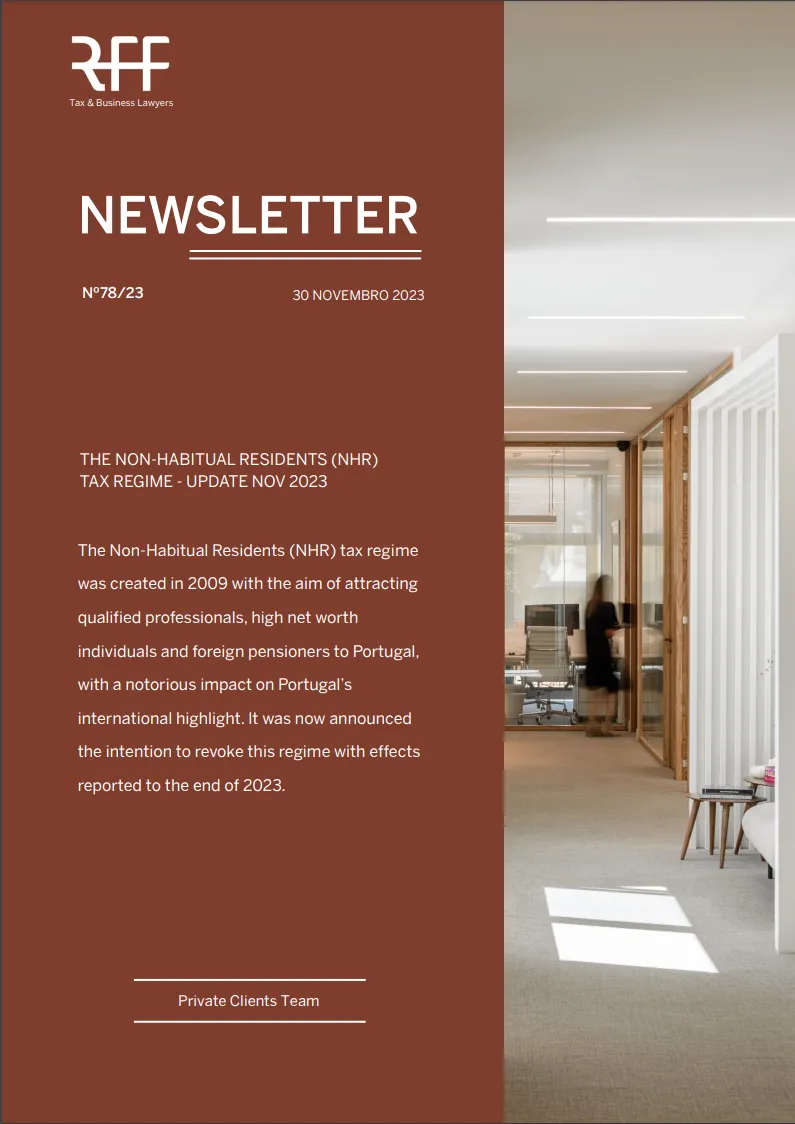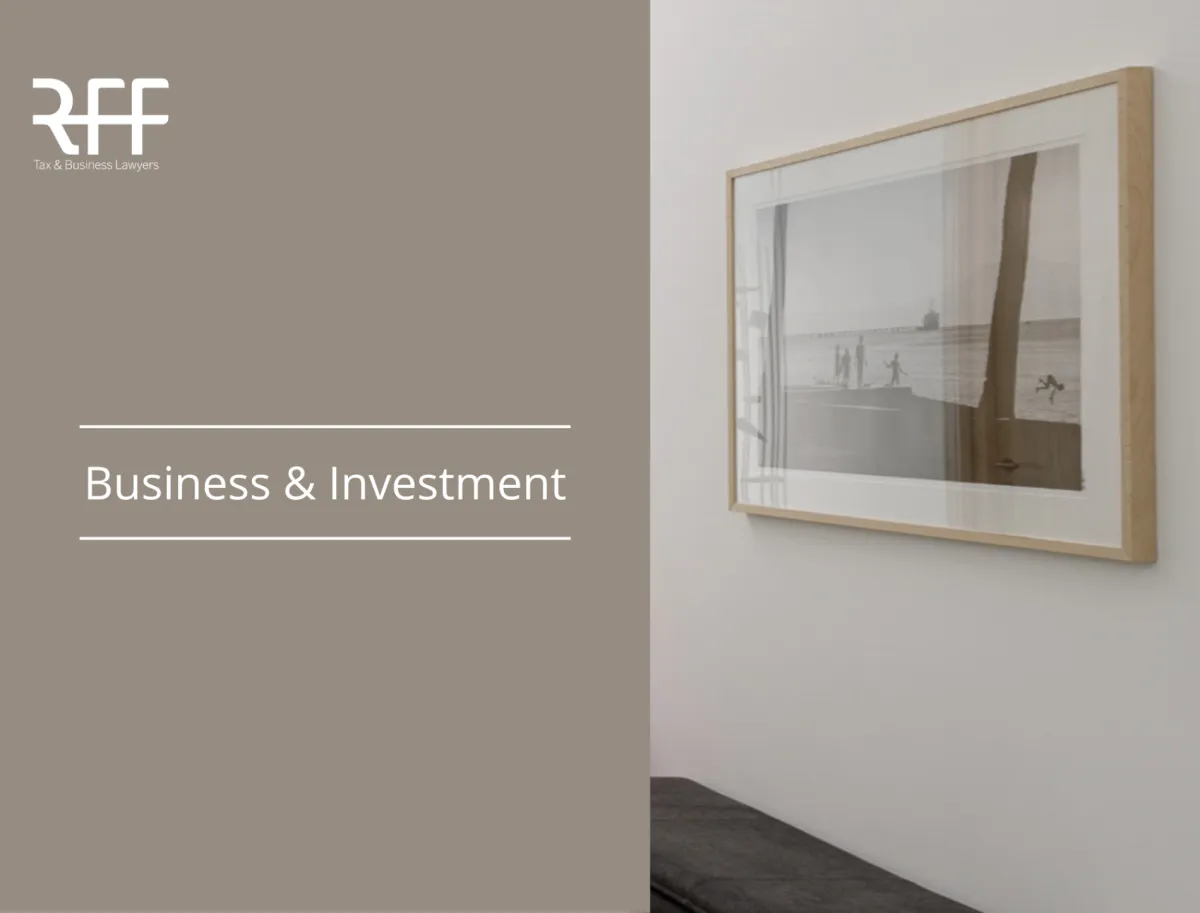The Non-Habitual Residents (NHR) Tax Regime - Update Nov 2023

The Non-Habitual Residents (NHR) Tax Regime - Update Nov 2023
The Non-Habitual Residents (NHR) tax regime was created in 2009 with the aim of attracting qualified professionals, high net worth individuals and foreign pensioners to Portugal, with a notorious impact on Portugal’s international highlight. It was now announced the intention to revoke this regime with effects reported to the end of 2023.
INTRODUCTION
The NHR tax regime, foreseen in the Portuguese Personal Income Tax (“PIT”) Code, was introduced by the Decree-Law no. 249/2009, of September 23rd, and completed by the Decree no. 12/2010, of January 7th, to attract to Portugal highly skilled professionals, high net worth INDIVIDUALS and foreign pensioners.
In fact, the NHR is a tax regime created with the aim of attracting foreign pensioners, professionals of high added value activities and the so-called “high net worth individuals” to Portugal by predicting a tax exemption or reduction on specific types of income.
WHO IS IT FOR?
The NHR tax regime is aimed at Non-Habitual Residents.
Non-Habitual Residents are (i) Individuals who transfer their tax residency to Portugal (i.e., become tax resident in Portugal) and (ii) who have not been considered as Portuguese tax residents in the last 5 years prior to the NHR application.
Regardless the NHR is a special tax status applicable to Portuguese tax residents.
HOW TO APPLY?
The enrolment as Non-Habitual Resident must be formally requested to the Tax Authorities by the taxpayer until March 31st of the following year in which the applicant becomes a Portuguese tax resident.
In this formal request, the individual wishing to benefit from this regime must declare the conditions required to be considered as a Non-Habitual tax Resident in Portuguese are fulfilled.
Nevertheless, the Tax Authorities makes, subsequently the automatically control of information they have on the taxpayer that may indicate the taxpayer’s qualification as resident in those five years, namely having been registered as such, having filed a tax return as resident, having been beneficiary of employment or self-employment income as resident (reported by a company in an official statement) or having been exempt from municipal property tax as a resident.
FOR HOW LONG?
Once registered as NHR, the tax regime is applicable for 10 years and the taxpayer may choose to be taxed under the underlying special taxation regime for 10 years as of the year of registry as resident in Portuguese territory.
However, if the taxpayer becomes non-resident during this 10-year period, the suspension of the registration as NHR is allowed, having the possibility of the application of the regime being resumed once is requested by taxpayer, insofar within the 10-year period.
WHICH TYPES OF INCOME DOES IT INCUDE?
In practical terms, the NHR regime presents clear advantages, such as the fact that the employment income (category A) and self-employment income (category B) rendering of high added value activities, with scientific, artistic or technical nature, listed in the Ministerial Order no. 12/2010, of January 7th , are subject to PIT at a flat 20% tax when compared to the progressive tax rates foreseen in the PIT Code, which can go up to 53%.
In addition, most of the income earned abroad by “non-habitual residents” will be exempt in Portugal as long as certain conditions are verified.
Thus, the employment income obtained abroad by NHR may benefit from a PIT exemption in Portugal, provided that the following conditions are met:
- it is effectively taxed at source according to the applicable Double Tax Treaty (DTT); or
- in case there is no DTT, the income is effectively taxed at source and cannot be considered as obtained in Portugal.
Regarding the foreign-sourced income, derived from activities, with scientific, artistic or technical nature, including self-employment income, listed in the Ministerial Order no. 12/2010, of January 7th (as amended by Ministerial Order no 230/2019, of July, 23rd) or income resulting from intellectual property, industrial property, or from the supply of information concerning an industrial, commercial or scientific derived from acquired experience, as well as investment income, real estate income, capital gains, could also be exempted from PIT in Portugal provided that the following conditions are met:
- they may be taxed at source according to the applicable Double Tax Treaty (DTT); or
- they may be taxed in another country under the terms defined by the OECD Model Tax Convention on In-come and Capital (in case there is no DTT) if it is not a territory listed by Portugal as a tax haven and, if the corresponding income, cannot be considered to have been obtained on Portuguese territory.
Moreover, passive income qualified within categories (E), (F) and (G) may benefit from a tax exemption if under the applicable DTT the source jurisdiction also has taxation rights.
Finally, foreign sourced pension income may benefit from a reduced tax rate of 10%, which corresponds to the latest amendments to the regime regarding pension income, which was before exempt of taxation.
WHICH ARE THE HIGH VALUED ACTIVITIES?
It should be noted that the list of high value-added activities was substantially amended. Indeed, until December 31st, 2019, the list covered professions in various industries, such as architects and engineers, fine artists, actors and musicians, auditors and tax consultants, doctors and dentists, university professors, other professionals, investors, administrators, and managers, amongst others.
The new list, applicable as of January 1st, 2020, has eliminated several of those activities, while foreseeing new ones, now based on the Portuguese Classification of Professions (CPP).
RECENT DEVELOPMENTS: STATE BUDGET PROPOSAL FOR 2024
The initial State Budget Proposal for 2024 presented on October 10th, included a proposal for the termination of the NHR tax regime in the terms in which it is currently in force.
According to this initial proposal presented, those who fulfil the criteria to access the regime, namely by changing their tax residency to Portugal by the end of 2023, would be grandfathered.
Meanwhile and during the discussion in the Portuguese Parliament of the State Budget Proposal the Socialist Party (party that supports the government and has the majority in the Portuguese Parliament) proposed an important amendment.
Said proposal aims to strengthen the NHR transitional regime, making it possible to safeguard the legitimate expectations of citizens who have already taken a number of material steps to change their tax residence to Portugal, based on the regime that ends with the State Budget for 2024.
Thus, contrary to what was first proposed, the applicants in the following conditions will still be able to apply for the NHR:
- On December 31st, 2023, meet the conditions to qualify as residents for tax purposes in Portuguese territory; and
- Become residents for tax purposes by December 31st, 2024, and who declare, for the purposes of their registration as a non-habitual resident, that they have one of the following:
- Promise or work contract, promise or agreement of secondment concluded until December 31st, 2023, the performance of whose duties is to take place in national territory; or,
- Lease agreement or other agreement granting the use or possession of real estate in Portuguese territory signed until October 10th, 2023; or
- Reservation contract or promissory contract for the acquisition of a right in rem over real estate in Portuguese territory signed until October 10th, 2023; or
- Enrolment or registration for dependents in an educational establishment in Portuguese territory, completed by October 10th, 2023;
- Residence visa or residence permit valid until December 31st, 2023;
- Procedure, initiated until December 31st, 2023, for granting a residence visa or residence permit, before the competent authorities, in accordance with the legislation in force applicable to immigration, namely through the request for an appointment or actual appointment for submission of the application for a residence visa or residence permit, or by submitting the application for the granting of residence visa or residence permit.
- Being a family member of the applicants in any of the situations mentioned above referred.
CONCLUSIONS
We are closely monitoring the discussions on the future of the NHR that are being held in the Portuguese Parliament, being the final voting scheduled for the 29th of November.
We will update, if necessary, as soon as the State Budget Proposal for 2024 is published.
***
Rogério Fernandes Ferreira
Duarte Ornelas Monteiro
Joana Marques Alves
Ricardo Miguel Martins
Raquel Silva Simões
Ana Sofia Gariso
Amélia Carvela
Nicolas Corrêa Simonini
